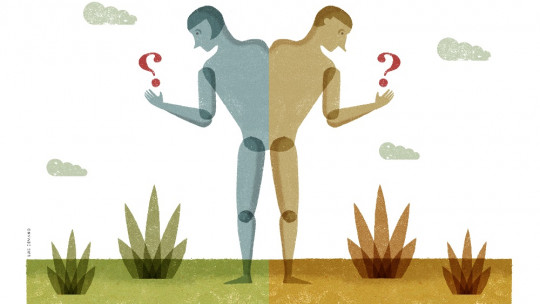Have you sometimes been overcome by a feeling of dissatisfaction and you don’t understand why? Maybe you are going through an identity crisis. Find out why it happens and how to overcome it.

A identity crisis It is a feeling of emptiness, loneliness and nostalgia that implies that we require certain changes in our lives. Although it hurts us all to experience an emotional imbalance of this type, the reality is that these identity problems are completely normal and it is a feeling that at some point or another we will have to experience in our lives.
Although they are experiences that we do not want, identity crises are important because they help us grow as people, to realize that we have to evolve towards another state. In this way it is Loss of identity It allows us to be aware that some of the things we do have become burdens and it is necessary to change them. It is not unusual to feel lost, that we do not have a goal in life, that we have entered a monotony. This state is unpleasant and uncomfortable, but it is necessary to go through this emotion and thus become comfortable. The first step is to accept that we feel bad, that is, knowing how to identify the situation and begin the process of change. We have to start by going deeper into ourselves, into what we really want before looking left and right for an easy solution. This way we will know where we want to go. Above all, there is no running away, it is a matter of time, of accepting that it is a process we have to go through.
“Crisis is necessary for humanity to advance. Only in moments of crisis, great minds emerge”
Albert Einstein
What is an identity crisis?
A identity crisis in psychology It is an event that occurs when a person questions both their sense of self and their place in the world. This concept originated with the work of psychologist Erik Erikson, who stated that the definition of identity in people is one of the most important conflicts that people face. Therefore, according to Erikson, identity problems signal a moment of intensive analysis and exploration of different ways of seeing oneself.
Although our psychological identity is largely formed during our adolescence, Erikson thought that this formation and growth of identity was limited only to this stage of our lives. According to this author, personality crises and identity problems are processes that are experienced throughout our lives as people face new challenges and experiences.
What is an identity?
When we refer to identity in psychology, we are pointing out the experiences, relationships, values and memories that make up the meaning of a person. Therefore, it is what allows us to create a continuous image of ourselves throughout our existence. When there is an emotional imbalance or a loss of personal identity, it is because we no longer like this image of ourselves or we need to change it.

Symptoms of an identity crisis
To find out if you have one identity crisis, a test Simple answers can be a good way to identify this state. According to psychologists, you can detect this state through the following questions.
- That I’m passionate?
- What are my spiritual beliefs?
- What are my values?
- What is my role in society or my purpose in life?
- Who I am? This question can be in general or regarding your relationships, age, and/or career.
If you don’t know how to answer these questions firmly, it is very possible that you are going through one of these personal identity problems If, in addition to this, you see that you do not stop having negative feelings about your life, you may be going through depression. In these cases, it is essential to consult with a professional psychologist.
Causes of an identity crisis
On some occasions a identity crisis in psychology It can be decisive in defining our personality. When people have a loss of identity the meaning of the crisis may be a response to a sudden change in the person’s life. So much so that these types of experiences can be had during the following events
- Start a new relationship
- Break up with a marriage or relationship
- Experiencing a traumatic event
- Have a child
- Know a chronic illness
- Losing a loved one
- Losing or starting a job
Some of these identity problems They can be passed through personal and introspective work. On the other hand, when these are experiences that become part of your routine for a long time, it is important to consult with a professional psychologist, since this can reveal a mental health problem.

How to recover from an identity crisis?
In many cases there are some attitudes that you can take to be able to overcome an identity crisis According to psychologists, the following tips can be helpful in overcoming this loss of identity.
Explore your beliefs and interests
During a personality crisis It is essential to try to question yourself and try to answer these questions being as sincere as possible. In this way, one of the keys is to try to get out of your comfort zone to discover new hobbies and interests that can lead you to a new definition of your personal identity.
Think about your goals
In a psychological identity crisis It is vital to try to think about what goals you have for your life. Questions like: What do you want to achieve through your existence?, or What kinds of things bring you the most joy and happiness? They are the keys to trying to see what is wrong in your daily life and what has led you to this identity crisis.
Talk about it with your friends and family
Sometimes talking about these internal processes with our closest friends and family can be one of the most effective ways to find a solution for this. Loss of identity
Take time to think and wonder about it.
When you are in a situation of emotional imbalance or an identity crisis, it is essential to try to take a break. During this, you should try to relax and explore within yourself. To do this you can ask yourself questions like:
- What qualities and characteristics define you? How has this changed over the years?
- How things have changed? Are you happy with these changes? How can you cope with these new things that are happening?
- What are your values? Is there anything working against them?
- What are your interests, passions and hobbies? Are you doing what you like to do? If not, why not?
- What motivates you? What helps you cope with problems?
- What is important to you regarding their values, purpose in life, or sense of identity? Is there anything you think you can do to improve your sense of self?
- What makes you happy? What gives your life a sense of purpose and joy?
These are some of the steps you can take if you think you are going through a personal identity crisis As we have already said, going through these moments is a process that we need to identify when things are going in the wrong direction. It will only be up to you to take the reins of your life again and look for what you are missing to fill that void.








